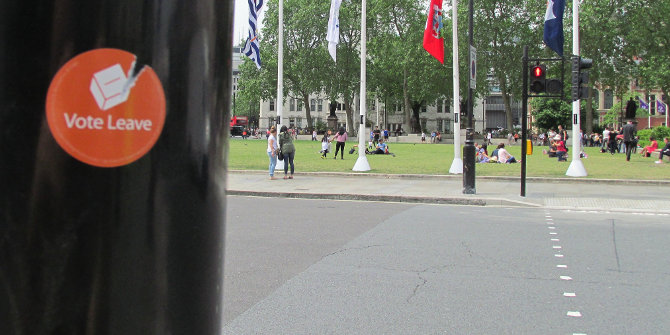 What consequences will Britain’s EU referendum have for both the UK and the rest of Europe? In a series of papers published as a collaboration between EUROPP and CIDOB (the Barcelona Centre for International Affairs), LSE authors analyse the prospects for three scenarios – a Bremain, a ‘soft’ Brexit and a ‘harsh’ Brexit. Tim Oliver discusses what would happen in the case of a ‘harsh’ Brexit, which is defined as the UK exiting the EU with a significant deterioration in relations between Britain and other EU countries. The full papers are available here.
What consequences will Britain’s EU referendum have for both the UK and the rest of Europe? In a series of papers published as a collaboration between EUROPP and CIDOB (the Barcelona Centre for International Affairs), LSE authors analyse the prospects for three scenarios – a Bremain, a ‘soft’ Brexit and a ‘harsh’ Brexit. Tim Oliver discusses what would happen in the case of a ‘harsh’ Brexit, which is defined as the UK exiting the EU with a significant deterioration in relations between Britain and other EU countries. The full papers are available here.
Nobody should underestimate the task that would face both the UK and the remaining EU (rEU) if on 23 June the British people vote to leave. Not only would such a decision be unprecedented, it would also bring about a situation few elsewhere in the rEU – and UK government – have given much thought to dealing with.
A harsh Brexit would unfold if trust collapses on all sides: where UK government becomes dysfunctional, UK-EU relations breakdown, and relations between rEU member states decline as they struggle to handle a Brexit and the other problems the Union faces. These would build on a foundation of UK-EU relations (which have a long history of difficulties) reaching new lows in recent years, and where the EU’s internal relations have been stretched by crises in the Eurozone and Schengen. Should a harsh Brexit scenario unfold then it would show a UK, EU and Europe lacking much by way of solidarity, trust and unity.
As I have previously argued, a British exit will be handled through a series of overlapping negotiations, which together create an ideal setup for division, delay and animosity. In the UK there will be negotiations within the governing Conservative party over its new leader, a process that could take several months and see the party’s civil-war unleashed by the referendum reach new highs. The government – when it finally has clear leadership – will face the challenge of negotiations within the houses of Commons and Lords where a victorious Brexit side of the Conservative party may lack a majority to get through any exit deal it wants. Negotiations will also need to take place with devolved governments and Greater London over their constitutional and policy role in any exit. These could become more fraught negotiations over the future in the UK of Scotland, and Northern Ireland’s place vis-à-vis a non-EU UK and an Ireland that remains inside the EU.
The UK and rEU will need to set out their respective negotiating positions and attempt to reach a deal as required under Article 50, the EU’s withdrawal clause. But this will be limited by nobody quite knowing what either the UK government wants (which depends on who ends up leading it) or what the rEU itself wants.
A series of rEU(UK) negotiations (from which the UK will be excluded) will take place where the remaining member states attempt to reach a deal over what to offer to the UK as an exit deal. Here the rEU will primarily struggle to balance ideas and interests. One aim of the rEU will be to protect its unity – the idea of political integration, of ‘ever closer union’. This will be to deter any further attempts to break away; perhaps by limiting any economic links the UK can expect outside the EU meaning the UK can expect the worst possible economic losses from a Brexit. Yet, some rEU states will struggle with the economic shock of losing one of the largest member states, a state that in 2014 ran a £61 billion trade deficit with the rest of the EU. For these states economic, and potentially security, interests will have to be taken into account.
Leadership through this will inevitably fall to the largest states such as Germany and France, but leaders in both face elections in 2017 and so will be limited in what they can offer by domestic politics. And not to be overlooked are the likely demands of the European Parliament (who will have to agree to any deal), a Commission that will provide the negotiating team and therefore try to push its own agenda, and a ECJ which depending on the outcome may have to rule on any deal.
The rEU will also need to find a way forward in managing a changed balance of power within the EU. The possibility of reshaping the Union’s policies in a host of areas may see some states manoeuvre to take advantage of the disappearance of one of the Union’s most liberal, free-trade and Eurosceptic members. There will inevitably be arguments over who makes up for the loss of the UK’s budgetary contributions (assuming any new UK-EU relationship is not akin to that held by Norway and so require the UK to continue contributing, albeit at a reduced rate).
Whether the rEU can maintain its unity and reach a deal with the UK depends largely on whether it can muddle through a Brexit. The crises the EU has faced over the past few years have been just as much about European unity; there has for example not simply been a refugee crisis facing Europe as much as a European crisis facing refugees. Nevertheless, the EU has successfully survived a series of crises in the Eurozone, Schengen and Ukraine through coping with them rather than solving them.
A Brexit would take the EU into uncharted and potentially more dangerous territory if it aligned with one or more of these crises (or a new one) that the EU has yet to solve. It is not beyond the realm of imagination to sketch out a scenario in which a Brexit and a Grexit at the same time strain the rEU to the point where key members such as Germany reappraise their approach to European unity and cooperation. Changes to Europe’s geopolitics would have knock-on effects for a host of relationships such as with the USA, Russia, Turkey and others.
It is, however, also possible to imagine a harsh Brexit leading to a more stable EU and a more settled UK-EU relationship. As historians often point out, the EU has often integrated in the face of crises. A Brexit (and thus the disappearance of one of the EU’s most awkward members) in combination with one or more other crises could see the EU take the necessary steps for it to move from coping to shaping events. The experiences of a harsh Brexit may also leave the UK more circumspect about what it can and cannot do in the world, and see an end to British politicians blaming the EU for many of the UK’s ills. Such an outcome from a harsh Brexit is to be hoped for, but a more negative and potentially disruptive one as outlined above should be borne in mind if the UK and EU are to avoid it.
Please read our comments policy before commenting.
Note: This article gives the views of the author, not the position of EUROPP – European Politics and Policy, nor of the London School of Economics. Featured image credit: Cristiano Betta (CC-BY-SA-2.0)
Shortened URL for this post: http://bit.ly/1UDDxBK
_________________________________
 Tim Oliver – LSE
Tim Oliver – LSE
Tim Oliver is a Dahrendorf Fellow at LSE IDEAS. His research focuses on UK politics, UK-EU relations and transatlantic relations. Educated at the University of Liverpool and the LSE, he has worked in the House of Lords, the European Parliament, the German Institute for International and Security Affairs (Berlin), the SAIS Center for Transatlantic Relations, and the RAND Corporation (both in Washington D.C.). He has taught at LSE, UCL and the Royal Military Academy Sandhurst.





The Threat to Democracy IN or OUT
“Finally, we note that UK businesses and policy-makers have been instrumental in replicating this privatisation of policy-making at the EU level. But it is not too late for Europe to avoid repeating the UK’s worst mistakes. We hope that this report will act as a warning against following the UK example.”
http://www.neweconomics.org/publications/entry/threat-to-democracy
Remainers seem determined to say or imply that Leaving the EU will necessarily bring calamitous uncertainty.
Why?
22,000 EU laws are embedded in UK law.
So UK exporters will remain compliant until such time as a future UK Government wants to make changes.
When it does – there will be no surprises, no “shocks” – no “leap in the dark”.
Under International Law, when countries break up there is a presumption of continuity (see Vienna Convention) – so there is no good reason to fear Leaving the EU.